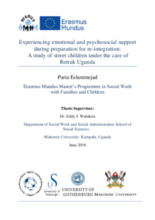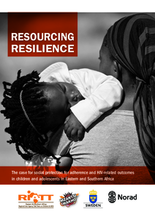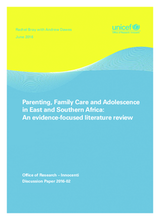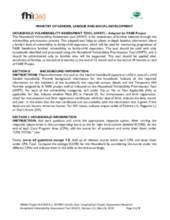Displaying 981 - 990 of 1617
This thesis investigates children’s experience of psychosocial and emotional support of (nonparental) caregivers in residential facilities in preparation for their re-integration into family based care.
This report includes a literature, evidentiary, and policy review of social protection in the Eastern and Southern African Region.
This paper examines existing knowledge on raising adolescents in east and southern African countries, including Kenya, Malawi, Mozambique, South Africa, Tanzania and Zimbabwe. According to the report, and within the context of these regions, parenting is understood to be handled through extended community and family networks.
This study investigates the effects of Community Care Coalitions on child protection in Assosa City, Ethiopia. It explores services and strategies employed by Community Care Coalitions to address child protection, as well as challenges faced by Community Care Coalitions while attempting to provide these services.
In this research paper Asnakech Tesfaye explores the expectations of Ethiopian children applying for an Australian Orphan Visa. Tesfaye’s research found children applying for visas expected to get better education, employment, material benefits and living conditions.
The aim of this mixed-method study was to explore the trajectories of leaving home, and views and experiences among children and youth in the Kagera region in Tanzania, who have lived on the streets or been domestic workers.
The Household Vulnerability Assessment tool (HVAT) is for assessment of families selected through the vulnerability prioritization process. This adapted tool helps to obtain in-depth baseline information about a family’s level of vulnerability to family-child separation, which will be used for monitoring progression of FARE beneficiary families’ vulnerability to family-child separation.
This post is part of the Better Volunteering Better Care Initiative’s month-long spread of articles aimed at raising awareness around the issues of orphanage volunteering. In this post, the author explains that, around the world, many orphanages are being run, not by government, but by church groups and individuals who start as volunteers. “The institutions are poorly regulated and they’re doing a job that could be done by the children’s families, with the right support,” says Smith.
This post is part of the Better Volunteering Better Care Initiative’s month-long spread of articles aimed at raising awareness around the issues of orphanage volunteering. In this post, the author describes his experiences with international volunteers in the orphanage where he lived and the larger problem of orphanage volunteering.
Gerald Campbell, a man from the state of Texas in the US who managed an orphanage in Malawi, has just pleaded guilty to sexually abusing the children in his care at the institution.




